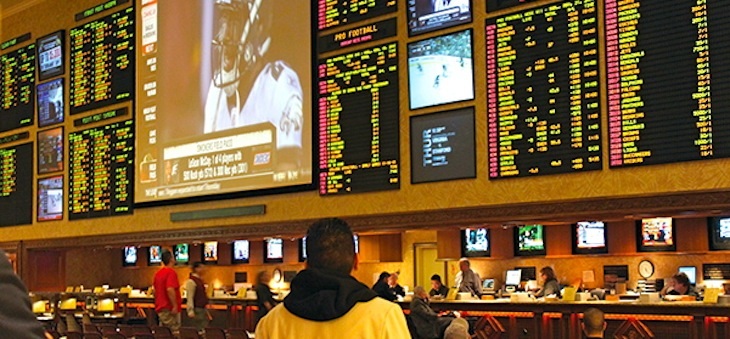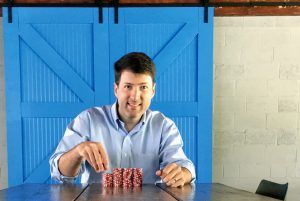Don’t bet on it: Impact in Arkansas of legalized sports gambling unclear
by August 13, 2018 10:01 am 1,872 views

In May, the U.S. Supreme Court overturned a federal law banning sports betting in most states. Theruling allows states to create their own legislation allowing sports betting in different forms. Arkansas statute forbids sports betting, although Arkansas legislators are now able to propose legislation to change that. (photo courtesy Wikimedia Commons/Baishampayah Ghose)
Southeastern Conference football has become increasingly like the NFL in the past couple decades. But there remain significant differences — not least of which is the widespread notion the college athlete is still amateur despite a big business setting and the injury report.
NFL teams release injury reports to the public, which serve to stoke media attention and, more importantly, to provide transparency to eliminate insider information that may benefit gamblers. College football traditionally hasn’t followed suit.
Now, thanks to a recent legalization of sports betting, it is.
“The change in sports gambling could be and will be likely the impetus for the creation of such reports in our future,” said Greg Sankey, Southeastern Conference (SEC) commissioner, in July.
The details — such as when the reports will be issued, how much less information they will contain due to privacy laws, which don’t exist for pros — are yet to be sorted out. But the major conference commissioners sound confident they are coming down the pipeline. Sports betting would have economic implications for every corner of Arkansas. How big a monetary splash it would make depends on a number of factors.
BACKGROUND
In May, the U.S. Supreme Court overturned a federal law banning sports betting in most states. The ruling allows states to create their own legislation allowing sports betting in different forms.
Delaware and New Jersey have begun offering Las Vegas-style sports betting. Mississippi and West Virginia are expected to be up and running by football season. Missouri, Louisiana and Oklahoma are farther from legalization, but bills allowing for expansion into sports betting have been introduced in those neighboring states.

Mississippi will become the first Southern state to allow for legalized betting. Its 28 casinos are all expected to add sports wagering, and revenue will be taxed at 8% by the state and at up to 4% by local government. One projection, according to industry experts and regulators cited in The Clarion-Ledger, estimates the government of Mississippi will initially pull in less than $5 million a year.
Mississippi’s foray into sports betting was a hot topic at SEC Spring Meetings in Destin, Fla., in early June. Scott Stricklin, Florida’s athletic director, said the SEC’s mandated injury report will likely have less information than the NFL’s — more of an “availability” report. Ole Miss athletic director Ross Bjork told Sports Illustrated that Mississippi State, Ole Miss and Southern Miss “are working together in preparation of the passage of the gaming commission’s regulations. The schools are currently setting up meetings with local authorities, the state legislature and the commission itself.”
As for the Razorbacks, athletic director Hunter Yurachek and head football coach Chad Morris have been quiet on the issue. Yurachek is studying the potential impacts of betting and “didn’t want to speculate based on what little information is actually out there,” said Kevin Trainor, associate athletic director.
When it comes to sports betting, Arkansas is in a more tentative situation than Mississippi. For starters, legalized sports wagering here isn’t a sure bet.
HURDLES IN ARKANSAS
Arkansas statute forbids sports betting. In the wake of the Supreme Court’s ruling, Arkansas legislators can propose legislation to enact sports betting that could take form in a number of formats: on-site casino, retail locales and online (via computer or mobile phone).
No such bill has been suggested. However, a proposed constitutional amendment that could be on the November ballot would legalize sports betting at four sites around the state. The group Driving Arkansas Forward has proposed the authorization of two new casinos — one in Jefferson County and one in Pope County — while enhancing the gaming operations at Oaklawn Racing & Gaming in Hot Springs and Southland Park Gaming and Racing in West Memphis.
One proposed benefit of the new casinos is that Arkansans would spend money in state instead of visiting nearby casinos. The Russellville casino (which doesn’t yet have a developer) would likely attract Razorback fans driving to or from Fayetteville.
“Russellville is a stopping off point already for Razorback travelers from central/south/east Arkansas,” Russellville Mayor Randall Horton wrote in an email. “A lot of fans have a tradition of stopping for a meal either at the Feltner’s Whatta-Burger or C.J.’s Butcher Boy [Burgers]. It is conceivable that some might rearrange their travel to leave a day early and spend the night at a gaming facility to play for a few hours or start back after a game, drive a couple hours toward home and then spend a night at the potential resort and then continue home on Sunday. Either is pure speculation.”
In May 2017, the American Gaming Association, a casino lobbyist group, released a report projecting the economic impact of legalized sports betting in each state. It broke down projections based on betting format and using three tax rates — base (10%), low (6.75%) and high (15%). Those tax rates applied to the gross gaming revenue, or amount retained by the sports betting operation after payment of prizes. On top of that is a 0.25% federal “handle” tax on the amount bet.
For Arkansas, projections were made assuming betting was legalized in an unspecified number of casino and retail locations. The report noted this would be a “mature” market “sufficient to allow operators to reach reasonable economies of scale.”
In that scenario, under the base tax rate, a total of $8.6 million would be raised through gaming revenue and handle taxes. The report’s Oxford Economics authors also estimated the total economic impacts including jobs, income and tax revenue. They noted these “direct effects” are “primarily the result of a shift of spending from illegal to legal markets, and therefore a net gain to the legal, measured economy.” Experts estimate the U.S. black market for illegal sports betting as between $67 billion and $150 billion.
The estimated total gross domestic product for legalized sports betting in Arkansas, in the above scenario, is $33.4 million. A total of $10.5 million in federal taxes and $8 million in state and local taxes would be generated.
No projections have estimated the economic impact of sports betting as part of the Driving Arkansas Forward’s proposed Arkansas Casino Gaming Amendment of 2018. That amendment proposes gaming revenue tax with tiers of 13% or 20%. Of the taxes raised, 27.5% will go to local municipalities, 17.5% to the Arkansas Racing Commission and 55% to the Arkansas General Revenue Fund.
The millions of dollars, which flow into the latter fund, will be used in two ways, according to Alex Gray, a Little Rock attorney who helped draft the amendment.
“The governor and the legislative tax task force have identified two priorities for additional funding in general revenue: one, lower state income tax and two, highway funding,” he said.
Some Arkansans, however, believe casino gambling and sports betting are a losing proposition that undermines society and hurts the economy.
“Casinos tend to prey on people with less money and less education,” said Jerry Cox, founder and president of the Little Rock-based Family Council. “Most studies we have seen indicate as an individual’s economic status goes down, their likelihood to engage in gambling goes up.”
A new report from the nonprofit Pew Charitable Trusts echoed some of Cox’s beliefs when it comes to so-called “sin taxes” on tobacco, alcohol and gambling, including lotteries and sports betting.
“Any of these new, or even existing, sin taxes are unlikely to be a silver bullet for larger budget issues — certainly, when attempting to resolve some of the larger structural budget challenges that many states are facing,” said Mary Murphy, Pew’s project director for state and local fiscal health, in a July press conference. In Mississippi, like in Arkansas, some of the projected sports betting tax revenue would go toward highway improvements.
Arkansas and Mississippi already share a kind of “sin tax” mutualism. Mississippians spend an estimated $5 million to $10 million a year playing the lottery in Arkansas. This is in part because Mississippi hasn’t legalized the lottery, while Arkansas has. Likewise, Arkansans gamble in Mississippi’s casinos, especially Tunica near Arkansas’ eastern border.
‘ONE MORE HEADACHE’
The national trend toward legalization of sports betting, whether it happens in state or not, will affect Razorback athletics. The trend presents a number of potential red flags and extra expenses for athletic departments across the nation. To begin, the NCAA has a new public image issue. Tom McMillen is the CEO of LEAD1 Association, which represents 131 Division I athletic directors including Yurachek and Arkansas State University’s Terry Mohajir.
“Athletic directors look at this as one more headache,” McMillen told the Pittsburgh Post-Gazette. “They’ve got sexual misconduct issues. They’ve got paying players … Now they’ve got to worry about point shaving?”
Additional cheating as a potential byproduct of legalized sports betting means sports departments will need to pour more resources into educating staff and student-athletes on regulations and compliance.
With legalized betting on the near horizon for Pennsylvania, University of Pittsburgh Athletic Director Heather Lyke is already looking at ways to cover the cost. Lyke, in a letter to the Pennsylvania Gaming Control Board, advocated for fees to cover the cost of hiring and training new staff to “greatly enhance [its] educational and compliance efforts.”
The increasing popularity and cultural acceptance of betting could be a financial boon to Razorback athletics. If betting in Arkansas is legalized, then one day it may benefit from an “integrity fee” — a small percentage (0.25%) of the amount wagered on college sports in state. Along with the University of Pittsburgh, Missouri, West Virginia, Marshall, Rutgers and Connecticut have looked into the fee, following the lead of the NBA, NFL, MLB and NHL, which already seek to implement such fees.
“We are aware of the national discussion of integrity fees. But in Arkansas any such fees would require new laws be passed by the state legislature, and we are not aware of any such laws being considered,” said Steve Voorhies, spokesman for the University of Arkansas.
More betting on Razorback athletics could also mean more fans watching games and purchasing licensed products.
“Gambling is a huge, huge fan engagement tool,” Andrew Brandt, director of sports law at Villanova University, told NPR. He quoted Nielsen research estimating the average NFL fan who is a non-bettor watches about 15 to 16 games a year. Meanwhile, the average NFL fan who is a bettor watches 45-50 games a year.
What would this mean for the Arkansas economy overall? That’s hard to answer, said Mervin Jebaraj, economist at the UA’s Center for Business & Economic Research.
“We won’t be able to accurately project an estimated impact until we figure out who does the betting, where they’re from, how long they stay in town.” Jebaraj co-authored a 2012 report on the economic impact of Razorback athletics. The report found the athletic department expended $84.7 million and produced a $124.1 million economic impact, while visitors to home baseball, basketball and football games generated an additional $29.6 million annually in 2011-12. Football by far generates the most revenue.
Most SEC coaches seem to shrug off the significance of fans betting legally as opposed to illegally. When it comes to the rabid fan bases of the SEC, the same old dynamic plays out again and again. During the SEC Spring Meetings, South Carolina Coach Will Muschamp was asked if fans would be upset if he elected not to kick a field goal late in a rout with the point spread on the line.
He deadpanned: “They’re usually pissed anyway.”
